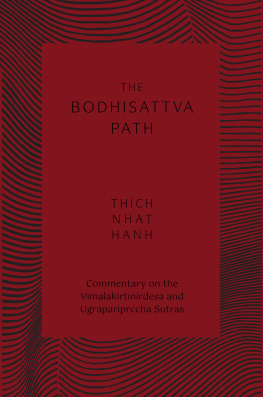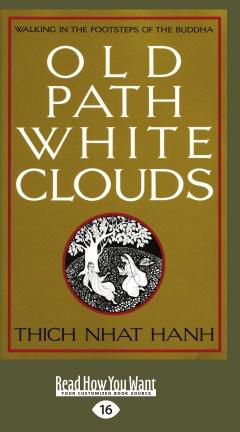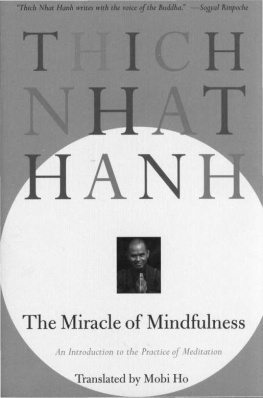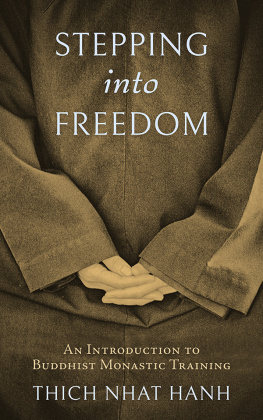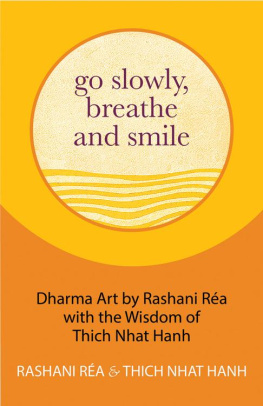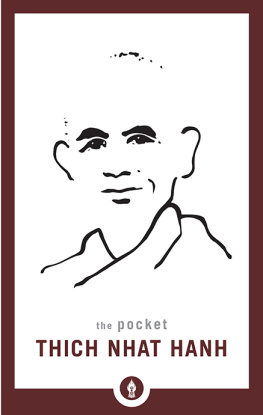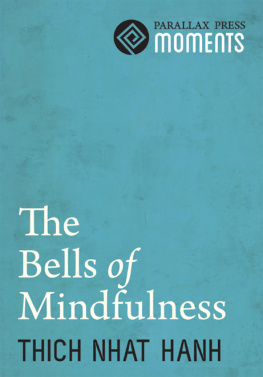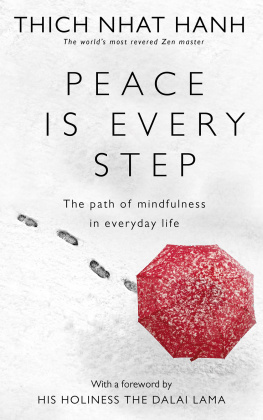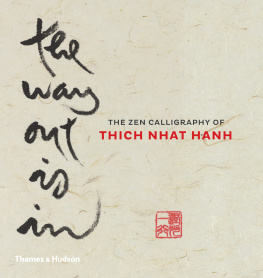

Parallax Press 
 P.O. Box 7355
P.O. Box 7355 
 Berkeley, California 94707
Berkeley, California 94707 
 www.parallax.org
www.parallax.org
Parallax Press is the publishing division | Drawings 1990 by Mayumi Oda |
of Unified Buddhist Church, Inc. | Cover art 2006 by Nicholas |
Copyright 2006 | Kirsten-Honshin |
by Unified Buddhist Church | Author photo by Richard Friday |
All Rights Reserved
No part of this book may be reproduced in any form or by any means, electronic or mechanical, including photocopying, recording, or by any other information storage and retrieval system or technologies now known or later developed, without permission in writing from the publisher.
Cover and text design by Gopa & Ted 2, Inc.
Author photo by Richard Friday
Library of Congress Cataloging-in-Publication Data
Nht Hanh, Thch.
[Tng buc no hoa sen. English]
Present moment, wonderful moment : mindfulness verses for daily living / Thich Nhat Hanh. [Rev. ed.].
p. cm.
Previously published: Berkeley, Calif. : Parallax Press, c1990.
1. Buddhist meditations. 2. BuddhismPrayer-books and devotionsEnglish. I. Title.
BQ9800.T5392N4548413 2006
294.3'4432dc22
2006030172
eISBN: 978-1-935209-48-5
6 7 / 13 12
TABLE OF CONTENTS








E VERYONE has pain and suffering. It is possible to let go of this pain and smile at our suffering. We can only do this if we know that the present moment is the only moment in which we can be alive.
Gathas are short verses that we can recite during our daily activities to help us return to the present moment and dwell in mindfulness. As exercises in both meditation and poetry, gathas are an essential part of Zen Buddhist tradition. Using a gatha doesnt require any special knowledge or religious practice. Some people like to memorize a favorite verse that they find they can come back to again and again. Others just like to write the verse down in a place they are likely to see it often.
The gathas in this book were first published in 1990. This edition contains three new gathas, some minor revisions to the original ones, and expanded commentary. The use of gathas goes back for over two thousand years. When I entered the Tu Hieu Monastery in Vietnam as a novice in 1942, I received a copy of Gathas for Everyday Use, compiled by the Chinese meditation master Du Ti. Du Tis book of fifty gathas was written for monks and nuns of former times. At Plum Village, where I live in France, we practice gathas when we wake up, when we enter the meditation hall, during meals, and when we wash the dishes. In fact, we recite gathas silently throughout the entire day to help us attend to the present moment. One summer, in order to help the children and adults at Plum Village practice mindfulness, we began assembling gathas relevant for life today. The result is this book of practical, down-to-earth verses.
We often become so busy that we forget what we are doing or even who we are. I know people who say they even forget to breathe! We forget to look at the people we love and to appreciate them, until it is too late. Even when we have some leisure time, we dont know how to get in touch with what is going on inside and outside of ourselves. So we turn on the television or pick up the telephone as if we might be able to escape from ourselves.
To meditate is to be aware of what is going onin our bodies, our feelings, our minds, and in the world. When we settle into the present moment, we can see beauties and wonders right before our eyesa newborn baby, the sun rising in the sky. We can be very happy just by being aware of what is in front of us.
Reciting gathas is one way to help us dwell in the present moment. When we focus our mind on a gatha, we return to ourselves and become more aware of each action. When the gatha ends, we continue our activity with heightened awareness. When we drive a car, signs can help us find our way. The sign and the road become one, and we see the sign all along the way until the next sign. When we practice with gathas, the gathas and the rest of our life become one, and we live our entire lives in awareness. This helps us very much, and it helps others as well. We find that we have more peace, calm, and joy, which we can share with others.
As exercises in both meditation and poetry, gathas are a key part of the Zen tradition. When you memorize a gatha, it will come to you quite naturally when you are doing the related activity, be it turning on the water or drinking a cup of tea. You dont need to learn all the verses at once. You can find one or two that resonate with you and learn more over time. After some time, you may find that you have learned all of them and are even creating your own. When I wrote the gathas for using the telephone, driving a car, and turning on the computer, I did so within the tradition that I inherited from my teachers. You are now one of the inheritors of this tradition. Composing your own gathas to fit the specific circumstances of your life is one wonderful way to practice mindfulness.
I hope you find this collection of gathas a steady and delightful companion.

Waking up this morning, I smile.
Twenty-four brand new hours are before me.
I vow to live fully in each moment
and to look at all beings with eyes of compassion.
W HAT BETTER WAY to start the day than with a smile? Your smile affirms your awareness and determination to live in peace and joy. How many days slip by in forgetfulness? What are you doing with your life? Look deeply, and smile. The source of a true smile is an awakened mind.
How can you remember to smile when you wake up? You might hang a remindersuch as a branch, a leaf, a painting, or some inspiring wordsin your window or from the ceiling above your bed. Once you develop the practice of smiling, you may not need a sign. You will smile as soon as you hear a bird sing or see the sunlight stream through the window and this will help you approach the day with more gentleness and understanding.
Next page

